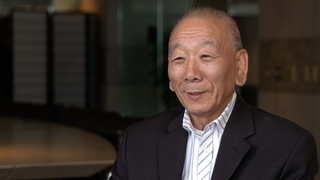Entrevistas
Parents identification as Peruvian Okinawan
From what I know, from the conversations that we’ve had, it’s always been both. It’s definitely Peruvian Okinawan. There’s a lot of Okinawan culture nuances that are very…like respect to your ancestors is huge for Japanese folks, for Okinawan folks. Like leaving senko, or taking care of an altar is something that my family still does. So when my grandpa’s oldest brother passed away, my grandpa is in his eighties, he still made the trip down to Peru to make sure that his brother had a proper burial and it was very traditional, all that.
And so my parents very much believe in that respect for family and ancestors, but at the same time if you were to come to a Yamashiro party, it would be filled with like salsa music and loud laughter and very, very joyous noises filling the room. Maybe not what a stereotypical person would perceive a Japanese or Okinawan…like maybe quieter. But I do think there’s some overlapping Okinawa culture’s also very much music based and then Latino culture is very much music based, so sharing that too.
You’ll see my parents doing kachashi, which is at the end of a big party, they always play this song, or songs, and everyone gets up and then they do this [demonstrates] and it’s just like a party of people just moving around and dancing. And they’ll do that and they’ll do traditional Peruvian music, to even…the indigenous folks – the Incan folks in Peru – so even that kind of music will be playing at a party.
So I think they very much have both, and then for them right now, as my younger brother and I are getting older, becoming adults as well, for them to kind of now they’re also adopting “American culture” too. So I think that’s something that’s so interesting, as I’ve gotten older and been able to talk to my parents more and more about what has been a culture shock for them and what has been something that they embraced has been so interesting. Because I think because they’re so used to this meld of multiple cultures, just accepting another culture being aware of the changes in culture is something that they see too.
Fecha: August 30, 2018
Zona: California, US
Entrevista: Sharon Yamato
País: Watase Media Arts Center, Japanese American National Museum
Explore More Videos

Defining "Nikkei"
(1941 - 2018) Reportero gráfico y activista japonés canadiense

Unique Identity from Having Multiple Backgrounds
(n.1938) Repatriada filipina de nacimiento que luego emigró a los Estados Unidos

Difficulty of spreading authentic sushi (Japanese)
(n. 1949) Chef de Sushi; Propietario de “Sushi Gen”, de Little Tokyo de Los Angeles

Teaching how to eat sushi (Japanese)
(n. 1949) Chef de Sushi; Propietario de “Sushi Gen”, de Little Tokyo de Los Angeles

Growing up Japanese in Hawaii
(n.1952) Antiguo ejecutivo de la banca, nacido en Hawái




Being Confused about Racial Identity in Postwar United States
(b. 1932) Actriz de teatro, cine y televisión nisei americana

Reuniting with parents in America
(n. 1938) Japonés estadounidense. Sobreviviente de la bomba atómica de Hiroshima

His views on nuclear weapons
(n. 1938) Japonés estadounidense. Sobreviviente de la bomba atómica de Hiroshima

Forcibly deported to the U.S. from Peru
(n. 1936) Japonés peruano encarcelado en Crystal City

About Escobar (Spanish)
(n. 1962) Nikkei argentino de “nissei” que reside en Japón.

Her definition of Nikkei
(n. 1974) Colombiana japonesa que actualmente reside en los Estados Unidos

Memories of childhood in Peru
(n. 1936) Japonés peruano encarcelado en Crystal City
